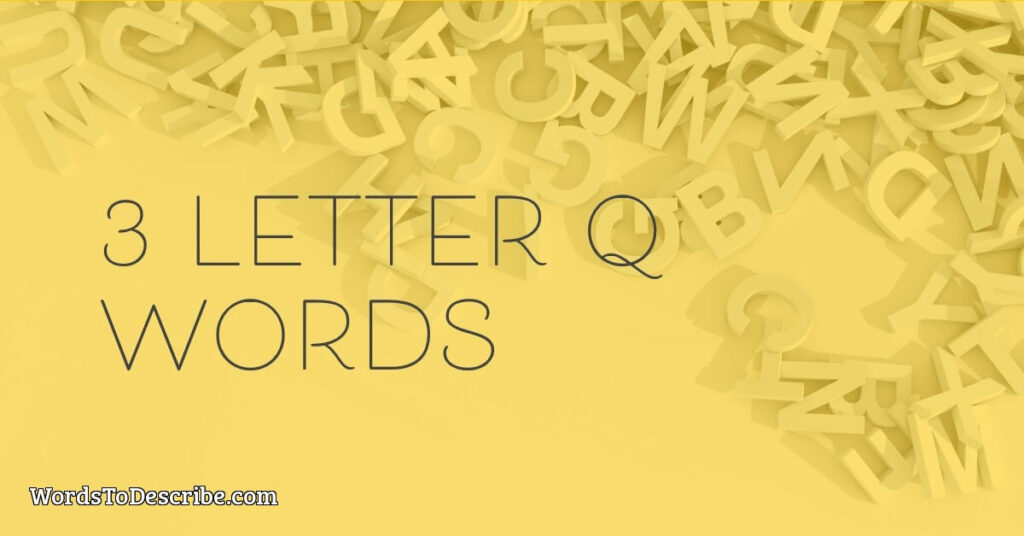
When it comes to the intriguing world of vocabulary, exploring 3 letter Q words opens up a fascinating realm of linguistic possibilities.
These compact yet distinctive words offer a unique glimpse into the richness and diversity of the English language. While there are way more adjectives that start with Q, there are nonetheless a few 3 letter words with Q in them.
From “Qat,” a type of shrub native to East Africa and the Arabian Peninsula, to “Qis,” a plural form of the noun “qi” in traditional Chinese culture, these 3 letter words starting with Q showcase an intriguing blend of cultural references and phonetic curiosities.
Despite their brevity, these words starting with Q possess a certain charm and enigmatic quality that piques our curiosity.
Whether it’s unraveling the meaning behind “Qis” or marveling at the botanical wonders of “Qat,” delving into this list of three-letter Q words unveils the hidden gems nestled within the alphabetic tapestry.
So, let’s embark on an expedition into the world of three letter words with Q at the beginning, where every syllable carries significance and each word tells its own concise story.
3 Letter Q Words
First, let’s take a look at the 3 letter words that begin with Q:
3 Letter Words Starting With Q
- Qat – A type of shrub native to the Horn of Africa and the Arabian Peninsula, whose leaves are often chewed for their stimulating effects.
- Qis – This is a term used in the game of Scrabble, representing the plural of “qi”, which is a concept from Chinese philosophy that refers to the life force or energy flow.
- Qua – As a preposition, it means “in the capacity of”; as an adverb, it means “as; as being”.
- Que – An abbreviation for “queue”, which can mean a line or sequence of people or vehicles awaiting their turn to be attended to or to proceed (the only 3 letter word with q and e).
- Qui – An abbreviation for “quiet”. Also, in the context of law, it can be a part of phrases like “qui tam”, referring to a type of lawsuit where a private individual assists in prosecuting.
- Quo: As a part of the Latin phrase “status quo”, it means “the existing state of affairs”.
The English language has a unique characteristic in which there are no standard 3 letter words ending in Q. Q is always followed by ‘U’ in English words, because of the way English has imported words from French, Latin, and Greek, which have this ‘qu’ combination. There may be abbreviations or newly coined words, but they are not officially recognized in English dictionaries.
Interestingly, there are only two 3 letter words with q and no u in them (quat and qis).
There is, however, one 3 letter word ending in Q, that is recognized by some, but not all, English dictionaries, despite not technically being an English word. The only 3 letter word ending in Q is:
3 Letter Words Ending in Q
- Suq – a variant spelling of the word ‘souk’ which means an outdoor marketplace in Muslim countries
In conclusion, exploring the realm of three letter words starting with Q or ending with Q takes us on a linguistic adventure that showcases the versatility and uniqueness of the English language.
These concise gems, such as “Qat” and “Qis,” captivate our curiosity with their brevity and enigmatic nature.
While the list of 3 letter Q words may be relatively short, it is a testament to the intricacies and complexities of language itself. Each word represents a distinct concept, cultural reference, or phonetic curiosity that adds depth to our communication.
By uncovering these linguistic treasures, we not only expand our vocabulary but also gain a deeper appreciation for the diverse ways in which language allows us to express ourselves. So, whether you’re challenging yourself to use these three letter Q words in a game or simply exploring their meanings out of curiosity, embrace the beauty and intrigue of these linguistic marvels.
They remind us that even in the smallest of packages, three letter words with Q in them hold the power to evoke thoughts, ignite imagination, and connect us through the universal medium of language.
